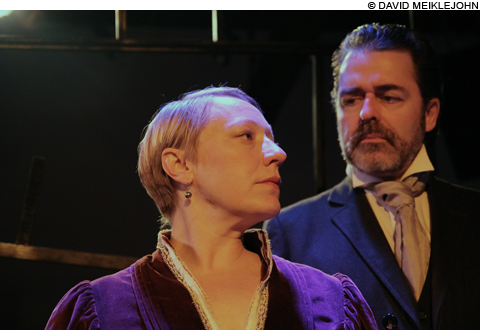
DEEP TENSION Karen Ball’s Mrs. Alving and James Hoban’s Pastor Manders. |
Myriad Portland spirits have conspired in raising the much-anticipated new production of Lorem Ipsum, an elegant, bewitchingly multi-medial staging of and around Henrik Ibsen's Ghosts. Ian Carlsen and Nicholas Schroeder (the Phoenix's own) direct the show at SPACE, which devotes its main gallery to symbiotic haunting for the length of the run, with an installation by Jessica Townes George and film by Derek Kimball and David Meiklejohn.
In Ibsen's harrowing social critique, more or less universally reviled upon its 1882 premiere, characters are haunted not by supernatural spooks, but by the acts of their forebears, society's repressive moral conventions, and the dark teem of impulses constrained. Well-to-do widow Helen Alving (Karen Ball) has protected her son Oswald (Michael Dix Thomas) from truths about his dead father, sending the boy abroad for much of his youth, for which she is chastised by her oblivious "spiritual advisor," the priggish Pastor Manders (James Hoban). Her husband's past also informs the Alvings' relationship with wooden-legged carpenter Engstrand (Corey Gagne) and his daughter Regina (Tess Van Horn), the household's maid, who aspires to more. Now that Oswald has arrived home, as Mrs. Alving is poised to open an orphanage as a memorial to his father, the ghosts, always lurking, will seethe.
During the day, George's installation is the full focus at SPACE, conjuring the play's bleakness and eerie fecundity with cool, provocative grace: Candles flicker in sand. Black window frames hang intact and deconstructed. In a black case, backlit with bare white bulbs, plant life steams under enclosed glass: ferns, moss, pomegranates mouse-furred with mold. And a view of the Alvings' household landscape, ominous in slate grays, is projected in Kimball and Meiklejohn's film loops. The overarching aura, pitch-perfect for the script, is at once dereliction and suffocation; the space feels at once hothouse, wake, and diseased altar, and one wonders at the synergy possible had more of the installation been incorporated into the performance.
During the show itself, the installation recedes, and for all the medial innovation of this enterprise, its theatrical direction is solidly classical, with a clarion fidelity to Ibsen's time, letter, and spirit. Christina Klein's gorgeous costume design in black, white, and burgundy is pure to period; film never intrudes upon staging; and the script's distant, rain-veiled fjords are breathtakingly rendered in ethereal blue-gray through windows (Corey Anderson's magnificent lighting). Rain is softly projected on window scrims over the full depth of the stage, magnifying the sense of enclosure, and the actors deliver Ibsen's economical dialogue with consummate restraint and nuance.
With her short hair and frankness of tone and gesture, Ball impeccably conveys the modern sensibility that puts Mrs. Alving at odds with Hoban's pompous Pastor Manders, for whom moral values are largely a question of social expediency. That all is not well with Mrs. Alving's son we sense before he's said a word or even made an appearance, as we hear something skin-crawling in Dix Thomas's laughter off-stage. Later, his angular, piercing Oswald is both frightening and wrenching, especially in his fevered attentions to Van Horn's watchful, expectant Regina, who pronounces with dulcet pathos the French words she has learned to impress him. And as the father she so disdains, Gagne is simply masterful, giving Engstrand an earthy ease and oceans of understanding in his gaze.